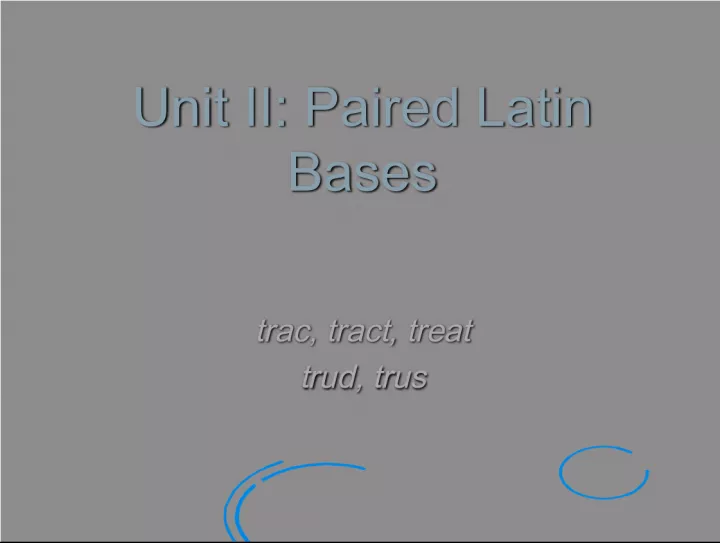Vocabulary Building and Reader's Response Interview


This article discusses the significance of building vocabulary through Paired Latin Bases and interviews. It offers insights on how to conduct a reader's response interview that promotes vocabulary building and comprehension.
- Uploaded on | 5 Views
-
 francesca
francesca
About Vocabulary Building and Reader's Response Interview
PowerPoint presentation about 'Vocabulary Building and Reader's Response Interview'. This presentation describes the topic on This article discusses the significance of building vocabulary through Paired Latin Bases and interviews. It offers insights on how to conduct a reader's response interview that promotes vocabulary building and comprehension.. The key topics included in this slideshow are vocabulary building, Reader's Response, Paired Latin Bases, Interview, comprehension,. Download this presentation absolutely free.
Presentation Transcript
1. Unit II: Paired Latin Bases Unit II: Paired Latin Bases trac, tract, treat trac, tract, treat trud, trus trud, trus
2. Bases trac, tract, treat = pull, draw, drag and Bases trac, tract, treat = pull, draw, drag and trud, trus = push, thrust trud, trus = push, thrust
3. Partner Interview Partner Interview -You have three minutes for each question -You have three minutes for each question -Write your answers in your Readers Response notebook -Write your answers in your Readers Response notebook -Write the date and then label in your notebook: -Write the date and then label in your notebook: Interviewer #1: Interviewer #1: Interviewer #2: Interviewer #2:
4. Bases trac, tract, treat and trud, trus Bases trac, tract, treat and trud, trus Interviewer 1 Interviewer 1 After subtracting its cost from her limited budget, she had to retract her offer to buy the trailer . After subtracting its cost from her limited budget, she had to retract her offer to buy the trailer . Q- How do subtracting, retract, and trailer mean pull, draw, drag? Q- How do subtracting, retract, and trailer mean pull, draw, drag?
5. Interviewer 2 Interviewer 2 The uninvited intruder tripped over a protruding chair that stopped her from further intrusion. The uninvited intruder tripped over a protruding chair that stopped her from further intrusion. Q- How do intruder, protruding, and intrusion mean push, thrust? Q- How do intruder, protruding, and intrusion mean push, thrust?
6. Bases trac, tract, treat and trud, trus Bases trac, tract, treat and trud, trus Match the definition with the correct word. Think about what the prefix means. Match the definition with the correct word. Think about what the prefix means. Write each sentence with the answer in your readers notebook Write each sentence with the answer in your readers notebook extract distract extract distract attraction intrude attraction intrude To draw or pull out To draw or pull out To draw in different directions To draw in different directions To push into a private space To push into a private space Feeling of being drawn toward someone Feeling of being drawn toward someone
7. Past,pastor=shepherd greg= flock, herd Past,pastor=shepherd greg= flock, herd Did you know? Did you know? The ancient Romans were superb farmers. Each large farm kept a stock of horses and oxen to pull plows and wagons. Horses were also used to remove tree stumps from the ground. Farmers attached one or more horses to a rope and had them pull out the trunks. The horses were so powerful that the Romans used them to measure the strength of all animals in units they called horsepower. Over time, however, these powerful farm animals grew old and weak. The ancient Romans were superb farmers. Each large farm kept a stock of horses and oxen to pull plows and wagons. Horses were also used to remove tree stumps from the ground. Farmers attached one or more horses to a rope and had them pull out the trunks. The horses were so powerful that the Romans used them to measure the strength of all animals in units they called horsepower. Over time, however, these powerful farm animals grew old and weak. Roman horses were put out to pasture. In gratitude for their years of hard labor, the farmers let the aged animals spend the rest of their lives grazing in pastoral bliss. Today we still use horsepower as a unit of measurement to describe the strengths of automobiles, tractors, lawn mowers, and even snow blowers! Roman horses were put out to pasture. In gratitude for their years of hard labor, the farmers let the aged animals spend the rest of their lives grazing in pastoral bliss. Today we still use horsepower as a unit of measurement to describe the strengths of automobiles, tractors, lawn mowers, and even snow blowers!
10. Select the best antonym for the word on the left. Select the best antonym for the word on the left.